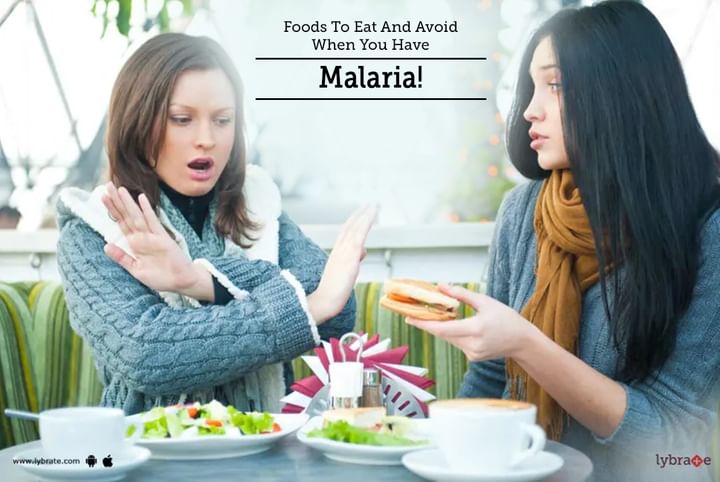Foods To Eat And Avoid When You Have Malaria!
Malaria is a protozoal disease, transmitted by the female Anopheles mosquito. The mosquito transmits a parasite known as Plasmodium from an infected person to a healthy person. Once released into the bloodstream, the parasite infects the red blood cells. The disease is associated with flu-like symptoms, such as high fever, chills, headache, vomiting, diarrhoea etc.
Malaria can weaken your immune system. Although there is no specific diet to treat malaria, your body will need sufficient nutrition to be able to combat the disease. Therefore, a diet plan for malaria patients should focus on improving immunity without harming any other organs in the body, like the digestive system, liver, or kidney. Patients are advised to eat smaller portions throughout the day.
Here is a diet plan recommended for malaria patients –
Foods to eat
-
Energy-giving foods
Malaria increases your BMR (Body Metabolic Rate), due to which the calorie requirement also increases depending on the rise in temperature. During high fever, it is likely to lose appetite, and so, calorie intake is a huge challenge. Consuming foods high in carbohydrates is essentially important during this time. A diet rich in carbs will boost your energy levels. Focus on eating rice, and vitamin C and vitamin A-rich fruits and vegetables, like sweet lime, beetroot, papaya, carrots, berries, grapes, and lemon. Drink sufficient amounts of coconut water, fruit juices, glucose water and electoral water, as it helps detoxify your body and boost the immune system.
-
Protein-rich foods
When you are recovering from malaria, the protein requirement in your body increases, as you lose massive tissue in the process. A diet rich in protein and carbohydrates can help your body utilize protein for tissue and anabolic repair and building purpose. Increase your protein intake by consuming more eggs, chicken stew or soup, curd, milk, buttermilk etc to fulfil your body’s requirement.
-
Consume fats in moderation
Your body sure needs healthy fats to function properly – but that should be in moderation. Fats from milk products and dairy fats, such as cream and butter aid digestion, as they consist of MCT or medium-chain triglycerides. Using too much fat in cooking or hogging on unhealthy, fried foods can cause nausea and impaired digestion, often leading to diarrhoea. Instead, rely on fatty fish and nuts to load up on Omega-3, as they work effectively to ease inflammation.
-
Vitamin-rich foods
Loss of electrolytes and water is common when you have malaria. Foods and beverages, including rice, dal water, juice and stew, broth and soup, electoral water, coconut water etc are extremely beneficial for stocking up on and maintaining the right balance of electrolytes. Focus on eating foods that are loaded with Vitamins C and A, particularly citrus fruits like, lemon, orange, sweet lime, pineapple, berries, grapes etc. Foods rich in Vitamin B Complex, such as red meat and poultry, cheese, milk, eggs, fatty fish, and vegetables like kale and spinach, are also essential for boosting immunity.
-
Lots of fluids
Drink lots of water and other fluids to compensate for the lost fluids from the body and avoid dehydration. A fluid intake of 3 to 3.5 litres daily is recommended.
Foods to avoid
-
Stay away from foods that are high in fibre, such as leafy greens and whole-grain cereals – oats, barley, millets, and wheat
-
Avoid eating processed, fried foods and junk foods, spicy and oily foods like potato chips, burgers and pickles
-
Cut down on coffee, cocoa, tea, coffee, and other caffeinated beverages
Malaria is treatable. However, the high dose of antibiotics and anti-parasitic medications can leave you lethargic and the immune system weak. Following a nutritious diet plan in all-essential for people recovering from malaria. A wholesome, balanced diet loaded with pulses, cereals, fruits, milk and dairy products, fish and chicken stew provides sufficient nutrition and help strike the right balance of fluid recommended for malaria patients.



+1.svg)
